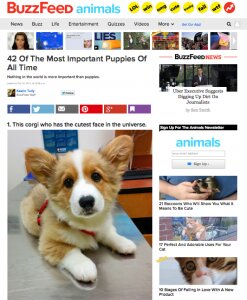
November 20, 2014
BuzzFeed CEO offers lessons on how social media has changed the way we communicate
by Carol Lundberg If there’s anything that BuzzFeed founder and CEO Jonah Peretti wants media professionals to understand about social media, it’s that they should never underestimate the importance of cute animals. Never underestimate [...]
by Carol Lundberg
If there’s anything that BuzzFeed founder and CEO Jonah Peretti wants media professionals to understand about social media, it’s that they should never underestimate the importance of cute animals.
Never underestimate the importance of cute animals on the Internet.
He would know, probably more than almost anyone. He founded the digital media company, which some describe as a viral-content machine, in 2006. And much of its content indeed goes viral, from lists and quizzes to serious news and lifestyle features, to (of course) cute animals.
In the early days of social media, much of the content people liked to share included cute kittens and puppies doing things that cute kittens and puppies do.
“Things like basset hounds running were very important to the Internet because they are cute and very LOL,” Peretti said at a Nov. 12 Adcrafters luncheon, where he offered insight into the way social media is changing the greater media landscape. “But it’s not just the cuteness that was, and is, important. It’s the connectedness. People feel connected when they share.”
Sometimes sharing is therapeutic. After the Sandy Hook Elementary School shooting in December 2012, there was a “shared emotion was a zeitgeist of depression,” Peretti said. People were going into BuzzFeed’s archives, and finding “faith in humanity” types of posts to share, with status updates that stated things like “I needed this today.”
And often it’s just fun, like many popular identity quizzes, such as “Which city shout you actually live in?” which was the first of BuzzFeed’s quizzes to take off in a big way.
Peretti offered a few other takeaway lessons:
Messages go viral in days or hours. Peretti was a pioneer in viral content, and went viral before social media, back in 2001, when he asked Nike to make him a “SWEATSHOP” shoe. That message took six months to go viral by way of email forwards. The following year, he and his comedienne sister developed “Rejection Line,” which took just three months to go viral. Now it can take days or hours.
People want to share. It doesn’t matter if it’s something funny or serious, people like to find common ground through sharing content. The latest BuzzFeed brand, BuzzFeed Motion Pictures, which operates on a four-acre studio lot in Hollywood. The studio has already enjoyed early success with its “Weird things all couples fight about,” which went viral in September 2014. The video expresses identity and ties viewers together with common experiences.
Sharing brings out our better selves. For example, Peretti credits social media with the marriage equality movement gaining recent momentum because people will share messages supporting positive change if they feel like they are among like-minded people. Though he said that brands should not become involved in political issues, when issues cross over into human rights, sharing an identity and supporting a stance can be powerful.
Mobile is huge and growing. Seventy percent of traffic to BuzzFeed is from mobile devices.
Social content is changing the overall media landscape. People have more choices now. On any evening, they have a choice between seeing what’s on television or cable TV, or surfing YouTube and other social media, Peretti said. Social content is making a dent, one that will grow larger, in consumption of television and cable television programming.
Respect cute animals. Cute animals are a great way to deliver messaging in a way that is entertaining. BuzzFeed works with 82 of the top 100 brands, Peretti said, and they have figured out how to make entertaining, and often adorable, content-based advertising.
BuzzFeed is not just an aggregator. The company produces its own content, including entertainment media, lifestyle features and news. BuzzFeed has invested heavily in its news division, led by Pulitzer Prize winners Mark Schoofs and Chris Hamby. The news division has broken some fairly weighty investigative pieces, such as an October story about possible conflict of interest at the NSA.
The greatest takeaway about social media and viral content is that “It’s not all about A/B testing and APIs,” Peretti said. “Social things are powerful human stories.”
Share This Story, Choose Your Platform!
Marx Layne is your competitive advantage.
Your reputation and success are our only concerns.
